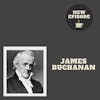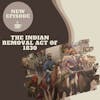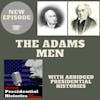James Buchanan

A president who consistently ranks toward the bottom of the list, James Buchanan made several missteps during his tenure that furthered the country toward war. How is that a man who spent his entire adult life striving for the highest political office could fail so tremendously?
Tune in this week to find out.
SOURCES
Baker, Jean H.. James Buchanan. United States: Times Books, 2004.
Balcerski, Thomas. “The 175-Year History of Speculating About James Buchanan’s Bachelorhood.” August 27, 2019. Smithsonian Magazine. (LINK)
“Biographies of the Secretaries of State: James Buchanan (1791-1868).” Office of the Historian. (LINK)
Cooper, William. “James Buchanan.” UVA Miller Center. (LINK)
“I had hoped for the nomination in 1844, again in 1848, and even in 1852, but now I would hesitate to take it. Before many years, the abolitionists will bring war upon this land. It may come during the next presidential term.” James Buchanan, 1856.
Welcome to Civics and Coffee. My name is Alycia and I am a self-professed history nerd. Each week, I am going to chat about a topic on U.S history and give you both the highlights and occasionally break down some of the complexities in history; and share stories you may not remember learning in high school. All in the time it takes to enjoy a cup of coffee.
INTRO MUSIC
Hey everyone, welcome back.
Looking ahead to the election in 1856, soon to be fifteenth president James Buchanan looked on with trepidation. A man whose public service career had been building to becoming the chief executive, Buchanan was astute enough to realize that the nation was at its breaking point and war may soon be at hand. So why wasn’t he unable to stop it?
The only president to remain a bachelor his entire life, James Buchanan seemed like the perfect candidate to help the country avert internal strife. However, despite his sense of foreboding ahead of his election, his sympathetic view of Southerners proved to be more kindling for the fire that would eventually overtake the country.
So this week, I am talking about James Buchanan. Who was he? Why did his lifelong commitment to public service not better prepare him for the presidency? And what about the rumors as to the cause of his lifelong bachelorhood?
Grab your cup of coffee, peeps. Let’s do this.
James Buchanan was born in Cove Gap, Pennsylvania on April 23, 1791. He was the child of Irish immigrants and was one of eleven. His father, also James, had arrived in the United States just a decade before and built a successful life as a merchant. His mother, Elizabeth Speer, kept busy overseeing the large household and, according to Buchanan, was foundational in his development as it was she who told him about the great men of the past who had quote “been useful to their country” end quote. He was a strong student and at 16, enrolled at Dickinson College.
Finding his rebellious streak, Buchanan got into a bit of trouble and was expelled for bad behavior. Taking up drinking to impress his newfound friends, Buchanan managed to win back reinstatement due to the intervention of the minister who oversaw the college. The young student refocused his energies, graduating a year later with honors. He immediately shifted his attention toward the law, studying under the popular James Hopkins, and was admitted to the Pennsylvania bar in 1813 at just 22. He built quite a name for himself before entering politics the following year in Pennsylvania’s state house.
At 23, Buchanan was the youngest member to serve, which he did under the Federalist party banner. As the legislature met only a few months out of the year, Buchanan’s legal practice flourished and he continued to make a name for himself as one of the top legal minds in the area. It is around this time that Buchnanan apparently began courting Ann Coleman, the daughter of a wealthy owner of a local iron mine. Described by Buchanan biographer as having a quote: “slender body, dark hair, aquiline features, and dark oval eyes,” end quote, Ann was considered quite the catch.
By 1819, the two were engaged, however not all was perfect in paradise. There is some speculation as to what exactly caused the rift. Some historians claim Ann felt she was denied the attention expected from one’s fiance. Others have indicated that it was her family’s disapproval of their union that caused a break. There has also been a long time suspicion that Buchanan’s failure to meet the needs of his soon to be wife could be blamed on his sexuality. Whatever the cause, Ann soon wrote Buchanan a letter breaking their engagement. Before he could try to woo her back, Ann Coleman passed away. When James attempted to attend Ann’s funeral, he was refused entry by her father and the whole debacle created quite the stir amongst neighbors.
For his part, Buchanan played the devastated groom to be, apparently proclaiming he would never marry another. However, as historian and Buchanan biographer Jean Baker highlights, the future president would mention marriage at least two more times in his life - both when the bright political spotlight was upon him. Despite these flirtations with the idea of marriage, Buchanan remained single his entire life. As for the rumors about Buchanan’s sexual orientation, they seem to be nothing more than that: rumors. Many have pointed to Buchanan’s longtime friendship with former Vice President William Rufus King as evidence of a romantic relationship, however historians have thus far been able to find that quote unquote smoking gun evidence to prove, once and for all, Buchanan’s sexual preference. The two men were, for sure, close confidants and cherished each other’s advice and council. But anything beyond that remains speculative at best.
The death of Coleman prompted Buchanan to throw himself further into his work where he focused his attention on running for and securing a seat in the United States House of Representatives. He won in 1821, serving five consecutive terms until 1831. While in the House, Buchanan leveraged his legal training to serve on the House Judiciary Committee. He was also a loyal follower of Democratic president Andrew Jackson, who initially distrusted Buchanan, believing the congressman played a role in the quote unquote corrupt bargain that prevented his electoral victory in 1824. Despite Jackson’s unease with Buchanan, he continued to support the president and his agenda in Congress and was eventually appointed as an envoy to Russia in 1832 where he successfully secured a trade agreement.
Buchanan did not spend long in Russia, securing a seat in the United States Senate in 1833. Slavery was increasingly becoming the issue of the day and like so many other northern politicians, Buchanan opposed slavery in principle, but felt the Constitution protected slaveholders and did not want to upset the status quo. Sharing the sentiments of at least some of his northern colleagues, Buchanan was more angered at and fearful of abolitionists, whom he believed would generate conflict from their activities and constant push to outlaw the practice.
Having built a robust political career, Buchanan trained his eyes on the next logical step: the presidency. As I shared in my quote at the top of the episode, Buchanan coveted the presidential post as early as 1844. However, party leaders chose their dark horse candidate and James Polk seemingly came out of nowhere to win the presidency. Upon Polk’s victory, he appointed Buchanan as his Secretary of State, a post he remained in for the duration of Polk’s administration. Together, the two men nearly doubled the size of the United States, first with negotiating the Oregon treaty with Britain, then with the treaty of Guadalupe Hidalgo after the Mexican-American War.
Aware of Polk’s promise to serve a single term, Buchanan worked behind the scene to capture the nomination in 1848, but the party’s nomination went to Michigan Senator Lewis Cass instead. With his party voted out of the presidency with the election of Zachary Taylor, Buchanan returned to private life. However, politics was never far from his mind and he once again tried to secure his party’s nomination in 1852, going against rising political star Stephen Douglas and the 1848 losing candidate Lewis Cass. Though he tried to feign disinterest, writing to friends that he knew quote “how to be happy in retirement,” end quote, he nevertheless cautioned party leaders against nominating Cass due to his inability, in Buchanan’s estimation, to win his home state of Pennsylvania. When the convention began in June, no candidate secured the requisite number of votes to clinch the nomination, paving the way for compromise candidate Franklin Pierce.
Despite losing the big title, Buchanan remained in politics, serving as minister to Britain during Pierce’s administration. His deployment overseas came at an opportune time as Buchanan was able to avoid any involvement in the fight over the Kansas-Nebraska Act and the violence that followed. However, his time as minister wasn’t without some questionable actions. It was during this time, for example, that he engaged in a plot to either buy or conquer Cuba from the Spanish government to help expand slavery for southerners. Regardless of these actions as minister, when it came time to choose a candidate for the 1856 election, Buchanan was seen as relatively clean. The other front runner, Stephen Douglas, was a major player in the fight over the Kansas-Nebraska Act and party leaders were too dissatisfied with Pierce’s performance to grant him another term. As historian William Cooper asserts, Buchanan was seen as a quote “smooth, pleasantly dull conservative” end quote.
Buchanan supporters worked to convince Douglas to drop out of the race to give him time to prepare for the 1860 contest. By the 17th ballot, James Buchanan was the party nominee. John C Breckinrdige of Kentucky got the nod for the Vice Presidency and together, the two men defeated republican candidate John C Fremont and former president and Know Nothing Party candidate Millard Fillmore, but their victory was far from overwhelming. The inclusion of a third party candidate always throws election results a little eschew, but Buchanan and Breckinridge did not win the popular vote and managed to secure victory in just four northern states. As Buchanan hailed from the north, this says something about the region’s faith in his abilities to represent their interests.
Buchanan made sure to put all doubts aside about where he stood on the issue of slavery during his inaugural address, asserting that it should be handled by the states. He also tipped his hand in announcing he would quote “cheerfully submit” end quote to the forthcoming Supreme Court ruling in the Dred Scott case. Buchanan had exchanged letters with a few of the Justices sitting on the court and was a bit heavy handed in his push for a definitive judgment in the case that, he hoped, would permanently resolve the issue of slavery in the United States. Of course, as we all know, the Scott decision did no such thing. And for those who may be wondering, yes, I will be dedicating an episode to the Dred Scott case here shortly.
While in office, Buchanan was forced to confront several domestic issues all relating to slavery. And, in each case, he failed to hit the mark and suffered from short sightedness. Kansas, violently debating over whether to allow slavery within its borders, had two opposing governments established: one by abolitionists, or free soilers, and the other by slavery supporters. The pro-slavery faction had convened and passed the Lecompton Constitution allowing the practice in the territory. Buchanan, a southern sympathizer who felt great animosity toward abolitionists, was only too willing to support the draft constitution, urging Congress to accept it and allow Kansas to enter the union as a slave state. He did this despite the fact that his own territorial governor cautioned against doing so, indicating that the constitution did not have the support of the majority of Kansas residents. As a compromise, Congress decided to send the constitution back to the territory for one final vote, where it was overwhelmingly defeated and Kasas would finally enter the union as a free state in 1861. Buchanan’s premature support of the slavery supporting constitution did not win him any favors and he was criticized for meddling and seen as inept.
Buchanan also had the terrible luck of being president during an economic downturn. Just after Buchanan entered office in 1857, the country faced a series of bank closures and business failures that overwhelmingly impacted the northern part of the country. Instead of trying to implement new fiscal policies to help alleviate some of the hardships, Buchanan simply choked it up to over speculation, a feeling shared by southern residents. These missteps paved the way from the nascent Republican party to gain political ground in the midterms, where they wrestled control of the house. Finally, Buchanan seemed to stammer in the aftermath of the raid on Harpers Ferry in 1859. While he sent in the marines to help end the attack, he avoided committing to a firm stance, referring to the issues of slavery as a disease.
In the final year of his presidency, Buchanan still sided with his southern neighbors, saying in his state of the union quote” “all that is necessary to accomplish the object, and all for which the slave states have ever contended, is to be let alone and permitted to manage their domestic institutions in their own way,” end quote. He proposed no federal solutions and worked hard to try to appease everyone. The country would be at war just a year later.
Given the chaos on the domestic front, Buchanan was unable to implement a robust foreign policy. Though he hoped to pursue the annexation of Cuba during his presidency, his efforts were stymied by republicans in Congress. The president also had his eyes on engaging with Mexico in response to the supposed harassment and murders along the newly established border. But again, Congress was preoccupied with domestic issues and refused to launch another military incursion.
As I will get into more in a future episode, Lincoln’s election in 1860 triggered a series of events, including the secession of several southern states, culminating in the Civil War. Again, Buchanan took no steps to maintain the union and watched helplessly as the southern members of his cabinet resigned en masse. And despite his support of the union during the war, Buchanan was a bit of a pariah as many blamed him and his ineffective leadership as the cause of the civil war. He worked hard to reframe his legacy, even publishing a book with his version of events in 1866 that went largely ignored by the reading public.
In 1868, the elder statesman caught a cold he never fully recovered from, dying on June 1st, 1868 from respiratory failure. He was 77.
Arguably one of the most seasoned and prepared politicians to ascend to the presidency in the nineteenth century, Buchanan continues to sit at the bottom of presidential rankings. Despite his experience, at the end of the day, Buchanan wanted to please everyone and as a result, angered everyone. While it is unfair to say that any one man caused the civil war, as president, James Buchanan was in a distinct position to help navigate the country through some of its darkest days and to provide moral leadership and courage. In both regards, he failed. And the country would never be the same as a result.
Before I sign off today, I want to give a heart felt thanks for Jennifer and Darren for their donations to the podcast through Buy Me A Coffee. This is truly a labor of love and it warms my heart to see people enjoy the episodes each and every week. If you want to support the show, be sure to check out the website, www dot civics and coffee dot com. There you will find transcripts, source material, and some ways you can show your love for the pod.
Thanks, peeps. I’ll see you next week.
Thanks for tuning and I hope you enjoyed this episode of Civics & Coffee. If you want to hear more small snippets from american history, be sure to subscribe wherever you get your podcasts. Thanks for listening and I look forward to our next cup of coffee together.
OUTRO MUSIC
Listener Favorites
Not sure where to begin? Take a listen to some fan favorites.

























